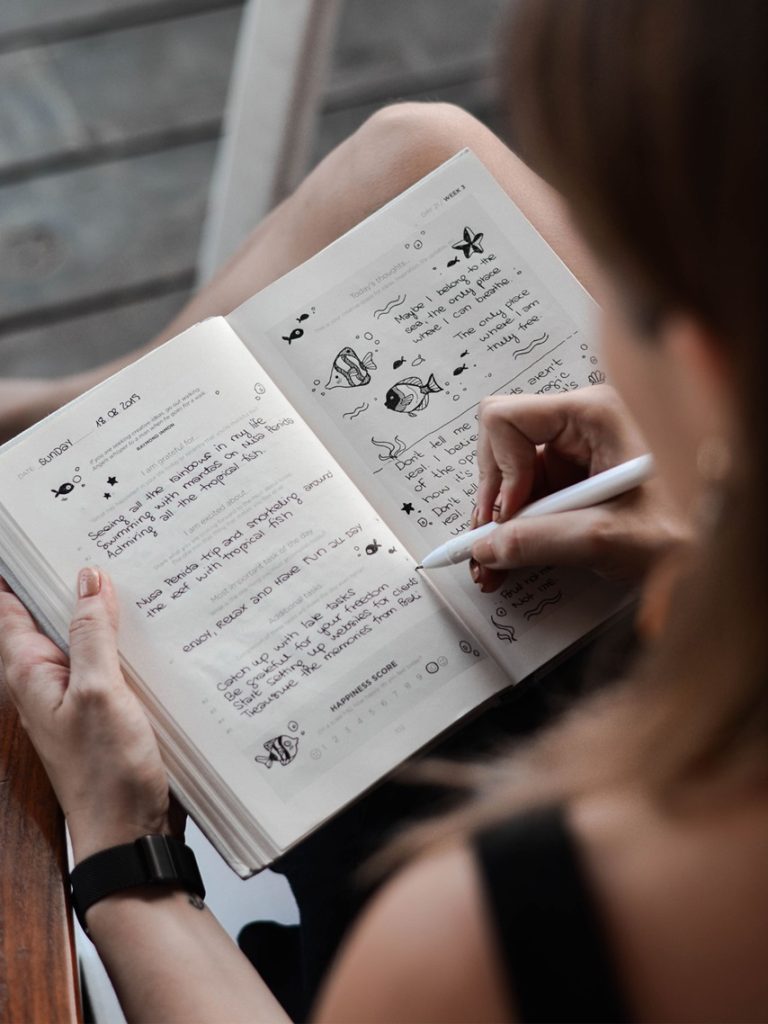Is your mind full of thoughts? All kinds of thoughts. Happy, sad, frustrating, embarrassing, scary, down-right crazy. What do you do with them? Let them overwhelm you? Forget about them? How about – write them down? Why? To see them. To face them. To understand them. Challenge, interpret, and remember them. Your journal is your soul’s story. It’s where you lay down all your burdens, plan your goals, reflect on your decisions, see yourself, and get to know that person.
Journals have been around for centuries as a means of recording thoughts, experiences, and emotions. We have heard time and time again that writing is a form of therapy, a record of our lives, and even a verification of our existence. While the concept may seem simple, the potential of journals is vast.
The Potential of Journals

Journals are not mere repositories for thoughts and events; they are powerful tools for personal growth, self-reflection, and creativity. They have the potential to give you insight into who you really are and who you want to become, be truly present and take a look at the interior. People have different reasons for keeping a journal, and even in this day and age, journals purchase is on the rise as we come to realise the benefits we get from writing.
Self-Reflection
One of the primary reasons people keep journals is to engage in self-reflection. Writing about your thoughts and experiences allows you to gain insight into your feelings and thought processes. It helps you understand yourself better and can lead to personal growth and self-improvement.
Emotional Catharsis
Journaling provides a safe space to express and release pent-up emotions. The act of putting your feelings into words can be therapeutic, helping you manage stress and emotional turmoil, without the bill. This is where your voice is authentic. No pretending, no masks, and no lies. You have a piece of paper that will keep your deepest thoughts.
Record-Keeping
Journals serve as records of your life, capturing memories, events, and experiences. Over time, they become a valuable resource for reminiscing and preserving your personal history and learning from it. Memory can be unreliable, notebooks are trustworthy witnesses.
Creativity
Many writers and artists use designer journals to spark creativity. Ideas, sketches, and random thoughts can be jotted down, serving as a wellspring of inspiration for future projects. Going back from time to time to look through your past ideas can lead to a breakthrough.
Problem-Solving
Journaling can be a problem-solving tool. By writing about challenges and possible solutions, you can clarify your thoughts and find new perspectives on issues you face.
Goal Setting
Setting and tracking goals is easier with a journal. By writing down your aspirations and breaking them into manageable steps, you can maintain focus and stay motivated.
Benefits of Keeping a Journal
- Improved Mental Health: Regular journaling has been linked to reduced stress and anxiety. It provides an outlet for processing negative emotions and promotes a more positive outlook on life. This is where you write an angry letter to your boss, a goodbye letter to your ex, vent in a safe space.
- Enhanced Emotional Intelligence: Journaling helps you become more in tune with your emotions, which can lead to better emotional regulation and greater empathy toward others.
- Clarity of Thought: Writing about complex or confusing thoughts can lead to greater clarity and understanding. This is particularly helpful when grappling with difficult decisions or philosophical questions.
- Increased Creativity: Journaling nurtures creativity by allowing you to explore ideas and thoughts without judgment. It encourages free thinking and imaginative expression.
- Greater Accountability: Tracking your progress and goals in a journal creates a sense of accountability. This can be a strong motivator to stay on course and achieve your objectives.
- Improved Handwriting: With the constant typing, people are forgetting how to write beautifully, or even legibly. By frequently writing in your journal, you will improve this skill.
What Is the Best Way to Keep a Journal?

There is no one-size-fits-all approach to journaling, as it can be adapted to suit individual preferences and needs. Here are several methods you can explore once you are done with your journals purchase.
Morning Pages: The concept of morning pages, popularized by Julia Cameron, involves writing three pages of stream-of-consciousness thoughts first thing in the morning. This practice can help clear your mind and increase creativity.
Gratitude Journal: A gratitude journal involves listing things you are thankful for each day. This practice fosters positivity and helps you focus on the good aspects of life.
Bullet Journaling: A bullet journal is a customizable system that combines elements of a to-do list, planner, and diary. It’s a creative and efficient way to stay organized and track your goals.
Art Journaling: This form of journaling combines writing with art. You can sketch, paint, or collage alongside your written thoughts, making it a great outlet for creativity.
Travel Journal: Document your adventures and experiences when travelling. Include details, sketches, and reflections to create a lasting record of your journeys.
Dream Journal: Record your dreams upon waking. Analysing your dreams can offer insights into your subconscious mind and provide a source of inspiration for creative work.
Reading Journal: Keep a record of books you read, your thoughts on them, and memorable quotes. This can deepen your engagement with literature and serve as a reference for future reading.
Digital Journaling: If you prefer digital tools, numerous apps and websites provide platforms for journaling, with the added benefit of cloud-based storage and easy accessibility.
Reflective Journal: Write reflections on your experiences, personal growth, or philosophical musings. This type of journal can be deeply introspective and help you make sense of life’s complexities.
Career Journal: Document your professional journey, including achievements, challenges, and aspirations. It can help you plan your career path and set goals.
Final Words
The potential of journals is immense, the reasons for keeping one are as diverse as the ways to do it, making it a versatile and accessible practice. Whether you’re seeking self-discovery, emotional catharsis, or a source of inspiration, journaling can be a transformative tool in your life. So, grab a notebook, and start exploring yourself.
